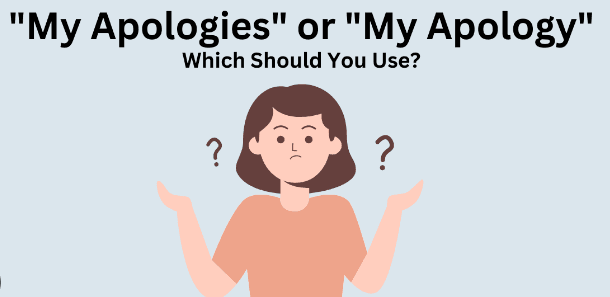Sorry or Not Sorry: The Fine Line Between 'Apologies' and 'Apologize'

Imagine this, you're in an international virtual meeting with clients from the US and UK. You easily navigate the discussion until you stumble upon a little speed bump - should you say "I apologize" or "my apologies" for a slight delay on your part? You feel uncertain, which shakes your confidence.
This scenario highlights why mastering minor details in English, such as 'apologies vs apologize', is crucial in a professional setting.
Understanding these small differences will improve your overall communication skills. So, let's delve into the specifics of 'apologies vs apologize'.
'Apologies' and 'Apologize': What Do They Really Mean?
When it comes to the English language, context is important. So, let's understand the terms 'apologies' and 'apologize' within their appropriate contexts.
The term 'apologies' is a noun that represents the expression of regret or sorrow for an error or offence.
On the other hand, 'apologize' is a verb that means to express regret or sorrow for an error or offence.
Apologies | Apologize | |
Meaning | Expression of regret or sorrow | To express regret or sorrow |
Usage | "My apologies for the delay." | "I apologize for my tardiness." |
These terms are often used interchangeably but are more appropriate in certain situations.
- Apologies
During formal communication
When addressing multiple people
- Apologize
During informal communication
In one-on-one conversations
When to Use 'Apologies' or 'Apologize' in Everyday Conversations?
Understanding the difference between 'apologies' and 'apologize' can be tricky. Here are some common scenarios where you might use these terms:
At the office: Your colleague is waiting for a report from you that got delayed. You can say, "I apologize for the delay. I'll send it across immediately."
At a social gathering: You accidentally stepped on someone's foot while dancing, causing them discomfort. You respond, "My sincere apologies for stepping on your foot."
On the other hand, many non-native English speakers in India often confuse these terms. For instance, saying "I apologies for the delay" instead of "I apologize for the delay" is a common mistake.
For more such insights into confusing words in English, check out Clapingo's blog list or YouTube videos.
The Impact of Culture on Language: Why Indians Might Struggle with 'Apologies' vs 'Apologize'?

Indian culture, rich in linguistic diversity, often influences the way Indians learn and use English. With multiple regional languages mixing with English, the difference between 'apologies' and 'apologize' might be difficult to understand.
Here are a couple of tips to navigate this cultural language barrier:
Be Context-Focused: Remember, 'apologize' is an action (verb), while 'apologies' is a noun (an expression of regret). For example, you apologize for being late but offer your apologies to your boss.
Practice Regularly: The key to mastering these differences is consistent practice. Use these words in daily conversations or writing exercises.
How Misusing 'Apologies' or 'Apologize' Can Create Communication Barriers
In professional settings, the misuse of 'apologies' and 'apologize' can trigger misunderstandings. For example, saying "Apologies for my mistake" instead of "I apologize for my mistake" can come across as being insensitive or rude. Similarly, telling someone "You should apologies" instead of "You should apologize" is grammatically incorrect and can convey a lack of language proficiency.
Finally, be cautious about using these terms excessively. Overusing 'sorry' or other forms of apology might make you appear less confident or assertive.
Quiz: Test Your Understanding of 'Apologies’ vs ‘Apologize'
Take this quiz to test your understanding of the usage between 'apologies' and 'apologize'.
1. Choose the correct sentence:
a) I apologies for my late arrival.
b) I apologize for my late arrival.
c) Both are correct.
2. Fill in the blanks: "My ________ if I kept you waiting."
a) Apologize
b) Apologies
3. Which is the noun form?
a) Apologize
b) Apologies
Answers:
1. B- The correct sentence is "I apologize for my late arrival."
2. B- "My apologies" is used as an expression of regret.
3. B- 'Apologies' is the noun form whereas 'apologize' is a verb.
How Clapingo Can Help You
Clapingo is an online platform that offers one-on-one personalized English fluency coaching. This platform is a game-changer in mastering challenging language nuances, such as the difference between 'apologies' and 'apologize'.
With adaptable sessions and a structured approach, Clapingo tutors focus on such specific issues to ensure learners grasp the proper usage and context of these words. Thus, making them skilled in articulating their thoughts accurately and confidently.
Wrapping Up
Understanding the subtle variations of English like the difference between 'apologies' and 'apologize' can greatly enhance your communication skills.
Here's a quick recap: 'Apologize' is a verb that denotes an action, as in "I apologize for the delay." On the other hand, 'apologies' is a noun, often used to convey regret or remorse for something, such as in "My apologies for the confusion."
As we wrap up this discussion, it becomes clear that resources like Clapingo are invaluable tools in improving your English skills. Taking advantage of personalized coaching sessions from native speakers is an effective way to understand and master English. Book a quick demo today!
FAQs
1. Can we use 'apologies' as a verb?
No, 'apologies' cannot be used as a verb. It's a noun and represents an act of apologizing. The verb form would be 'apologize'. For example: 'She has sent her apologies (noun) for not attending the meeting'. But 'She has apologies (verb) for not attending the meeting' would be incorrect.
2. Is it okay to use “my apologies” instead of “I’m sorry”?
Yes, both are expressions of regret and can be used interchangeably in most cases depending on formality level and context. While "I'm sorry" tends to be more personal and direct, "my apologies" is slightly more formal. For example, 'My apologies for the late response', is more formal than say, 'I'm sorry I responded late'.
3. Can "apologize" be used without an object?
Yes, it can be used without an object. When you say ‘I apologize’, it is clear that you're expressing regret but what for isn't specified. The context usually makes it clear though. For example: The speaker could say 'I apologize' after delivering a joke in bad taste.
Comments
Your comment has been submitted